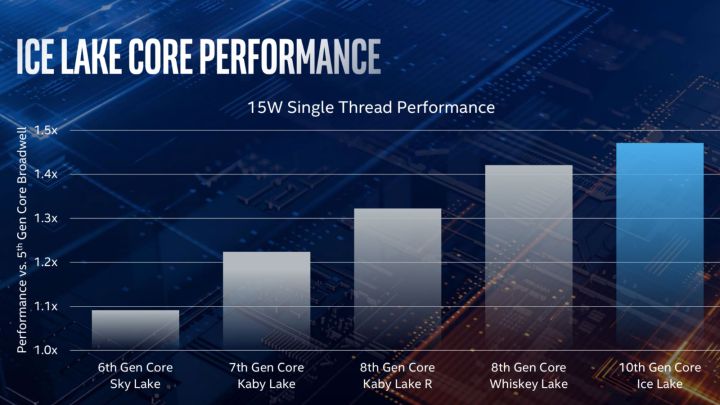
Consumers curious to know how Intel’s upcoming 10th-generation processors will stack up against AMD’s lineup are now getting their first snapshot, as benchmarks for an i7 model have leaked showing an edge over AMD’s Ryzen 9 3900X. The test, performed using Geekbench benchmarking tools on an HP Spectre x360 laptop, confirms that the i7-1065G7 CPU from Intel’s next generation of chips (known by the Ice Lake moniker) outperforms the Ryzen 9 3900X in single-core performance.
Although the Ryzen 9 3900X still enjoys a clear lead in multi-core processing, this is still quite a feat for the Ice Lake i7, and a huge vote of confidence for Intel. The results are that much more impressive considering that the nimble Ice Lake mobile chip can put out a higher single-core score despite the fact that it runs at less than half the base clock speed, and less than 20% of the thermal design power (TDP) wattage, of the beefier AMD Ryzen 9 desktop chip.
For Intel, this does more than merely deflate the boastful performance claims of their competitor’s powerhouse CPU. The leaked test scores more immediately stand as a compelling answer to the criticism surrounding Intel’s decision to push back a die-size shrink to 7nm until 2021. It not only demonstrates Intel’s methodical approach to ensuring quality in the new line’s reduction to 10nm dies, but it lends credibility to Intel’s stated philosophy of prioritizing performance over form factor. It also illustrates why Intel doesn’t invest time and money into chasing niche products like AMD’s Threadripper, instead favoring solid workhorse chips.
The leaked scores also bode well for Intel’s more ambitious undertakings. If Intel is capable of packing so much horsepower into a mobile Ice Lake chip, fully conceived hardware like the kind that Project Athena is aiming to produce, which tightly integrates processing and networking, may yield even more substantial efficiency gains.
It is performance like this that reminds us all why Intel has stayed so dominant for so long. If AMD wants a real shot at taking the fight to Intel, it’s going to have to move beyond the wow-factor tactic it has been pursuing since this year’s Computex and deliver simple, robust hardware.



